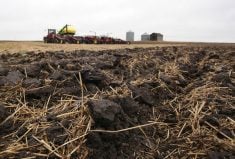Report says regulatory framework won’t allow much to happen on climate change and in some cases works against it
If Canada hopes to achieve its agricultural potential, it will need to at least keep up with American and other competitors who are doing much more to support their farmers’ efforts.
That’s one of the main conclusions of the New Ag Deal: Four Policy Transitions for a Climate Smart Food Powerhouse, a report written by the RBC Climate Action Institute, the Boston Consulting Group and the University of Guelph’s Arrell Food Institute.
Read Also

Saskatchewan puts crown land auction on hold
Auctions of Saskatchewan crown lease land are once again on hold.
“The incentives embedded in the U.S. Inflation Reduction Act are preparing American farmers to fight climate change through cutting-edge ag-tech, conservation projects and measures to better manage diverse weather events,” says the report.
“Canada’s current ag policy and fundings pale in comparison to IRA’s U.S.$19.5 billion in support of U.S. agriculture.”
For all of the Canadian government’s vocal support of the goal to fight climate change by reducing agricultural greenhouse gas emissions while providing food security, the report says today’s economic and regulatory framework won’t allow much to happen and in some cases is actually working against it.
For instance, some feed additives that could reduce animal emissions are classed as veterinary products, requiring a tortuous approval process. Biocontrol products that reduce crop emissions generally take more than a year to get Canadian Food Inspection Agency approval.
The report also highlights the frustration farmers feel when they are told they won’t be rewarded for beneficial practices they currently use.
It recommends a number of financial incentives that it believes would encourage farmers to embrace new technologies, experiment with novel ideas and commit to beneficial practices.
The United States is using tax credits to heavily subsidize the installation of biodigesters to reduce emissions from animal and other agricultural waste. Significant tax incentives are a prime way to encourage beneficial practices because farmers say they prefer tax credits over direct support.
There have been numerous attempts to evolve a carbon credits market, but none have yet found general success.
“While farmers are excited by the prospects, stories and experiences of past disappointment due to unsuccessful pilots that did not ultimately pay out, a lack of clear guidelines to make participation accessible and limited data and knowledge is dampening their enthusiasm.”
However, the report said better federal and provincial support and guidance could develop a huge carbon credit market, turning “soil into a $4 billion cash crop.” That’s something farmers could embrace.
The report also condemns the reduction in agricultural research and extension in recent years. While the U.S. and other players add research and extension resources to help farmers incorporate new technologies and management, Canada has chopped its support. Governments talk the talk of emissions reduction, but are doing a moonwalk away from supporting it.
“Recent environmental pledges, such as the fertilizer reduction targets of 30 percent, along with budget cuts to agricultural services, have only intensified skepticism,” said the report.
“Rebuilding trust will undoubtedly require time and commitment, but it is critical, especially at a time when U.S. (funding) is raising expectations of government commitment.”
Creating a renewable natural gas market and mandate would create the demand that would support the capture of greenhouse gases currently escaping into the air.
Private investment in Canadian ag-tech has been falling and is well below what is needed today. Governments should partner with industry to pay for new research and development that leads to needed emissions innovation.
“It would enable the country to grow more food with fewer emissions while giving innovative companies the opportunity to demonstrate their solutions and finance their innovations.”
The report highlights Canada’s importance as a food-exporting powerhouse. With climate change undermining the ability of some countries to provide food for themselves or others, Canada’s untapped potential to increase production can’t be squandered, the report argued. It’s almost a duty to develop it.
“We set out to explore what we believe is Canada’s moon shot: to produce 26 percent more food by 2050 — enough to maintain our contribution to the global population as it grows — with fewer emissions.”
















